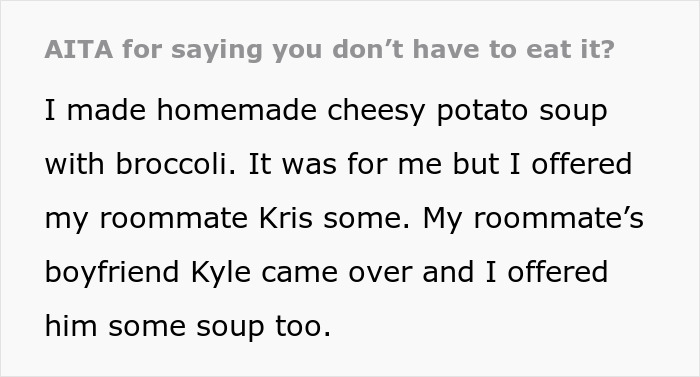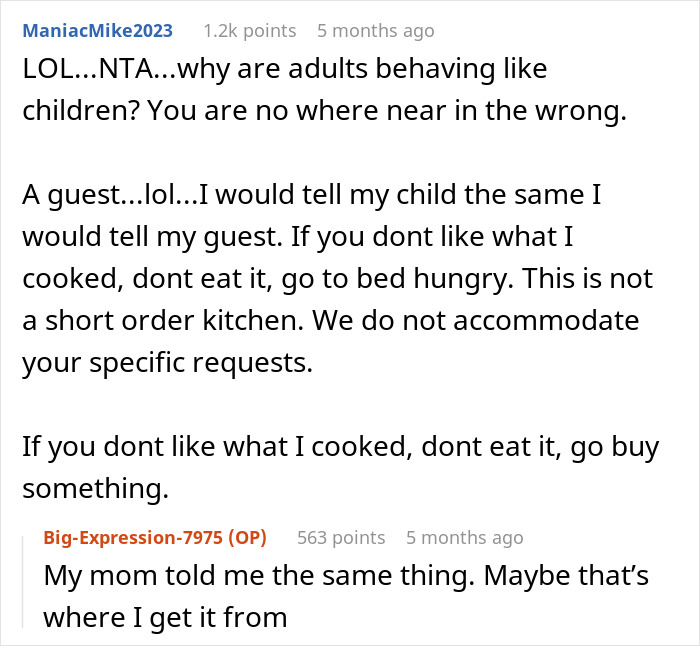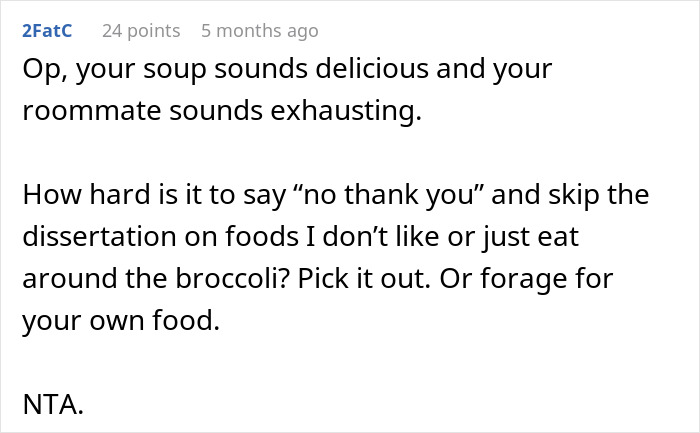The key factor that drives us to eat is, of course, hunger. But what we choose to consume is largely determined by our preferences.
For this redditor’s guest, the enemy was broccoli. Unfortunately for him, the host wasn’t going to cater to his aversion, causing a whole fight over a vegetable.
Scroll down to find the full story and a conversation with etiquette consultants Karen Thomas and Julia Esteve Boyd, who kindly agreed to tell us more about food preferences and guests.
What we choose to eat largely depends on our preferences

Image credit: Vadymvdrobot/Envato (not the actual photo)
However, this woman refused to accommodate her guest’s aversions, causing a fight over a vegetable




Image credit: Yurakrasil/Envato (not the actual photo)



Image credits: Big-Expression-7975
What we like to eat comes from a combination of genes and the environment
A food preference expert, Marcia Pelchat, explains that the reason we like what we like comes from a combination of genes and environment. Studies have found that people who dislike cilantro have a shared gene called OR6A2 that increases their sensitivity to the smell of aldehyde chemicals, which the herb and many other soaps contain.
Another way genes determine our response to food is through our noses. In fact, it’s our sense of smell that first makes us distinguish between different flavors. A yellow jelly bean may lead us to believe that it will be banana-flavored, while the scent indicates that it tastes of licorice.
Researchers suggest that unpleasant smells in the mouth could also be why many children dismiss vegetables such as broccoli and cabbage, debunking the idea that they are only fussy eaters. Scientists from Australia found enzymes in such greens that can produce a lingering scent when combined with bacteria in saliva. But while children refuse to consume them, adults learn to tolerate the odor over time.
Alternatively, others who study food preferences say that a person’s favorite food is largely determined by exposure and memories. Whereas, a lack of familiarity with food can make an individual more hesitant to try it. For instance, some people may have never tried liver and don’t plan to do so anytime soon.
Guests should never place their food preferences on hosts
Bored Panda reached out to etiquette consultants Karen Thomas, and Julia Esteve Boyd, who believe that a guest shouldn’t place demands on a host concerning their food preferences. “Rather, the host can offer to order out to accommodate the unexpected guest,” Thomas explains.
Or the visitor can bring alternative foods that they can consume. “One simply cannot expect to be overly accommodated with specific food options, especially if the host is not made aware,” she adds.
Boyd’s take on this is, “If a guest complains about the food, the host can try to accommodate, if possible, within the limits of what alternatives they can offer. The host can simply say, ‘It’s a shame you didn’t let me know earlier. I could have prepared an alternative for you. Let me see what I can rustle up for you.’ Not all dishes can be remade, especially at the last minute! I can think of many other responses—not so polite, but a good host will always try to be a good host!”
It’s another thing if the visiting person can’t eat certain things because of medical conditions. Thomas says, “A host should always attempt to accommodate the food allergies of a guest. The guest should tell about their situation at the RSVP stage of accepting the invite. For example: “I’m allergic to or I am a vegan, therefore I am unable to eat (list specifics). This will allow the host to make reasonable accommodations for them and share the menu with them to see if that guest is willing to partake.”
Thomas suggests that people with food allergies follow these easy steps to avoid conflict:
- RSVP immediately upon receiving the invitation and make food allergies/preferences known.
- Make arrangements with a host that are agreeable to both parties.
- If it’s a spontaneous event – the responsibility is on the guest to accommodate their own needs and remain polite to the host, who was uninformed.
While Boyd says, “Not every guest will love every food dish; it’s normal. A polite person will discreetly avoid eating what they don’t like. If a guest seems to be awkward, the host can do their best to offer alternatives when possible. Otherwise, my suggestion would be to make light of the situation, offer extra wine, and try to focus on the more important, less impolite guests so everyone can enjoy the meal. Don’t invite the rude guest again!”
People in the comments wonder why adults are behaving like children and refusing to eat broccoli




















